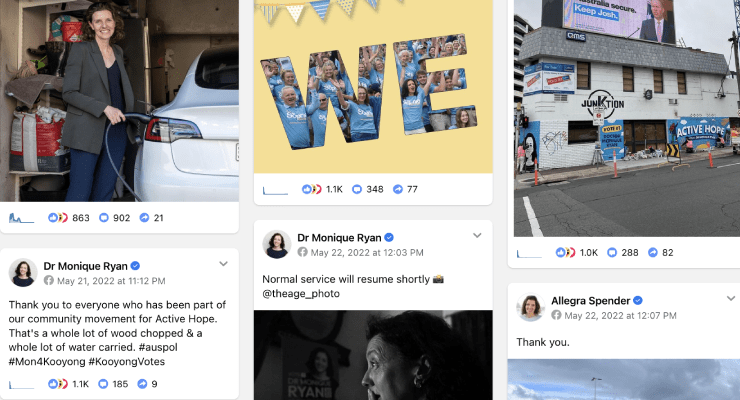
One of the people behind the teal independents’ federal election campaigns has pointed to their savvy use of digital advertising — taking advantage of the major parties’ mistakes — as one of the reasons behind their historic success.
Ed Coper is a director of Populares, a communications firm that ran the online advertising for the major teal independent campaigns. He’s also a GetUp! alumni and author of the book Facts and Other Lies: Welcome to the Disinformation Age.
In an interview with Crikey, Coper explained how the campaigns of Monique Ryan, Allegra Spender, Kylea Tink and Sophie Scamps seized on mistakes made by their incumbent opponents to convince them to vote for an independent.
Stressing that the independents operated on a shoestring budget compared to their opponents, Coper reiterated that the independents’ digital advertising campaigns couldn’t waste money. However, the restriction that created a need for targeted advertising, he said, also helped their messaging be more effective.
“People in advertising call [untargeted, broad advertising] ‘spray and pray’,” he said. “People think it works in politics, but convincing someone to vote is very different to getting them to buy a pair of sneakers.”
Traditionally, political parties use voter data such as demographics or issue targeting — a constituent who emails their local member about emissions targets would be recorded as someone interested in environmental issues, for example. Coper said that such analysis isn’t deep enough.
Their campaigns used “commercially available value segmentation” to guide their efforts. When pushed on what exactly that entails, Coper kept his cards close to his chest. He said they looked at “dozens of other markers” about voters, considered how that would apply to their politics and then ranked them by who was most likely to support independents so they could focus their resources there.
Beyond that, Coper said that mistakes made by their political opponents opened an alternative path to victory. He pointed towards their treatment of digital advertising as an afterthought to their strategy, rather than its core, as a problem: “You saw that a lot of their digital advertising were just re-cuts and resizing of their TV creative.”
While their campaigns’ digital advertising had started in late 2021, the Coalition’s incumbents only started theirs well into the election period. According to Coper, this gave them two benefits. Firstly, they were able to spend half a year trying to change people’s political attitudes. Secondly, they were able to test a variety of messages that meant that by the election period, the teal independents had already honed their final election pitch.
Part of their online messaging was demonstrating the volunteer, grassroots support for their campaigns. Campaigns like Monique Ryan’s featured testimonials, even selfies, from volunteers and voters who were supporting the independents. According to Coper, this content performed extremely well online.
“You want to see that other people are doing something. We want to do what our peers are doing. When you see people who are your friends and neighbours and colleagues, that’s really persuasive,” he said.
Earned media — marketing terminology for content that’s not created by a campaign, like newspaper articles — played an important part in the independent campaigns, Coper said. Since the independents had more work to do on introducing themselves to the electorate, traditional news coverage helped raise their profile and lend credibility to them. In some cases, the campaigns would pay for digital advertising to promote this content.
Counterintuitively, News Corp’s months-long campaign against the independents were no different to the rest of earned media. Coper said the enormous coverage helped elevate their candidates.
“When Monique Ryan was splashed across the full page of the Herald Sun or when Allegra Spender was covered every day in The Australian, that sends a powerful signal that it’s a real competition between the incumbent and independent,” he said.
“[News Corp’s attacks] were broadly very helpful.”








Interesting piece. Not just because it includes more humiliation for Murdoch. News Corp are still gloating after Rupert beat Elon to the punch, buying MySpace a whole 17 years before the latter bid for Twitter. They’ve kept their finger on the pulse ever since.
“When Monique Ryan was splashed across the full page of the Herald Sun or when Allegra Spender was covered every day in The Australian, that sends a powerful signal that it’s a real competition between the incumbent and independent,” he said.
“[News Corp’s attacks] were broadly very helpful.”
yes. Well there were different audiences weren’t they. I am sure there are a lot of people in the “teal” electorates who read the Australian but I am even more sure that these people: (a) are more discerning when reading a newspaper to distinguish lies from analysis, hyperbole masquerading as commentary and (b) not many of the “teal” electorates read the Daily Telegraph. That role is left for the high viz bogans wherever they are found.
Like Clover, every time the Tele attacks here more, her vote goes up. This didn’t happen to Julia are she was easy fodder for the bogan, misogynistic crowd. Different audience “teals”. The Libs know this now and will build their future hate-filed, duplicitous campaigns around Religion, Culture (particularly the absence thereof) and Sport.